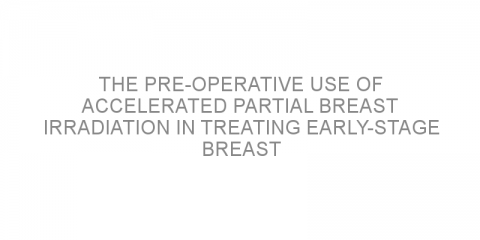In a nutshell This study investigated whether accelerated partial-breast irradiation (APBI) was useful for preoperative treatment of early-stage breast cancer (BC) patients. APBI was found to be an effective treatment option with good cosmetic results for certain early-stage BC patients. Some background Breast conserving therapy (surgery to remove...
Read MoreCurrent stage?-Stage I Posts on Medivizor
The timing of first biopsy and its effect on prostate cancer reclassification
In a nutshell The authors aimed to determine the influence of biopsy timing on prostate cancer reclassification during active surveillance. The authors concluded that the timing of the first biopsy was not related to an increased risk of cancer reclassification, but prostate specific antigen (PSA) and body mass index (BMI – measured based...
Read MoreDoes radiotherapy benefit older patients with triple-negative breast cancer
In a nutshell This study investigated the effects of radiotherapy (RT) in older patients with triple-negative breast cancer (TNBC). RT was found to be associated with better survival outcomes for both younger and older patients. Some background TNBC is a form of breast cancer which tests negative for estrogen/ progesterone receptors and human...
Read MoreThe impact of exercise on the risk of cardiovascular events in women with non-metastatic breast cancer
In a nutshell This study investigated whether exercise was associated with a reduction in the risk of cardiovascular disease (CVD) in patients with non-metastatic breast cancer (BC). Exercise was found to be linked to a significant reduction in the risk of CVD for this patient group. Some background CVD is a leading cause of death among women with...
Read MoreCan the development of lapatinib-related rash predict breast cancer outcome?
In a nutshell This study investigated how the early development of a rash in treatment with lapatinib (Tykerb) impacts survival outcomes in breast cancer. This study concluded that early development of rash may indicate the patients who will benefit more from lapatinib. Some background Lapatinib is a drug which targets epidermal...
Read MoreGuidelines for post-surgery treatment of patients with melanoma
In a nutshell In this study the Clinical Practice Guidelines in Oncology (NCCN Guidelines) in melanoma updated the 2016 recommendations on therapy after surgery and treatment of in-transit disease (when cancer cells are almost reaching the lymph nodes). Some background Melanoma incidence has been rising rapidly. Patient outlook and treatment...
Read MoreBreast density and the risk of contralateral breast cancer
In a nutshell This study investigated whether a high proportion of dense breast tissue is associated with an increased risk of developing contralateral breast cancer (CBC, cancer in the other breast). This study determined that those with dense breasts at the time of original diagnosis were significantly more likely to develop CBC than those...
Read MoreFollow-up of patients with colorectal cancer: A review
In a nutshell This study is the second update of a review focusing on the effects of an intense follow-up for patients with colorectal cancer after treatment. Some background Patients with colorectal cancer who underwent surgery or adjuvant therapy (treatment following surgery) are followed for several years. However, multiple appointments and...
Read MoreBlood counts after prostate surgery can predict clinical outcomes
In a nutshell This study examined whether the neutrophil-to-lymphocyte ratio (NLR) before treatment can be used to predict clinical outcomes in localized prostate cancer. Researchers reported poorer outcomes for patients with higher NLR after surgery. Some background Neutrophils are cells that are involved in inflammation (reaction to injury or...
Read MoreExtended adjuvant therapy in hormone-receptor-positive early breast cancer
In a nutshell This review examined the benefits of extending hormone therapy from 5 to 10 years in patients with hormone receptor positive breast cancer. The study concluded that treatment recommendations should take factors such as previous treatments and potential side effects into account. Some background Hormone-receptor (HR)-positive breast...
Read MoreStereotactic body radiotherapy for elderly patients with NSCLC
In a nutshell The authors aimed to determine whether SBRT is an effective and tolerable treatment for elderly patients with inoperable non-small cell lung cancer (NSCLC). They concluded that the treatment is both effective and safe. Some background In elderly patients with NSCLC, surgery is not always the best option. There is often a higher rate...
Read MoreExamining predictors of mortality in older patients treated with surgery
In a nutshell This study examined predictors of mortality risk in older prostate cancer patients treated with surgery. Authors reported that blood vessel disorders, severity of a whole-body disease, smoking status, and education level were significant predictors of mortality in older men treated with surgery. Some background Radical treatment...
Read More














